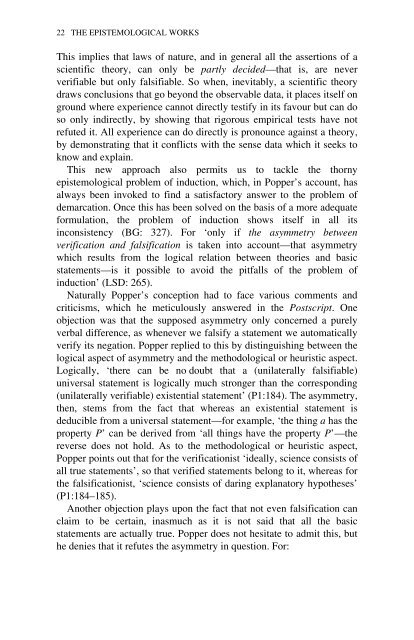20101108131129231
20101108131129231
20101108131129231
You also want an ePaper? Increase the reach of your titles
YUMPU automatically turns print PDFs into web optimized ePapers that Google loves.
22 THE EPISTEMOLOGICAL WORKSThis implies that laws of nature, and in general all the assertions of ascientific theory, can only be partly decided—that is, are neververifiable but only falsifiable. So when, inevitably, a scientific theorydraws conclusions that go beyond the observable data, it places itself onground where experience cannot directly testify in its favour but can doso only indirectly, by showing that rigorous empirical tests have notrefuted it. All experience can do directly is pronounce against a theory,by demonstrating that it conflicts with the sense data which it seeks toknow and explain.This new approach also permits us to tackle the thornyepistemological problem of induction, which, in Popper’s account, hasalways been invoked to find a satisfactory answer to the problem ofdemarcation. Once this has been solved on the basis of a more adequateformulation, the problem of induction shows itself in all itsinconsistency (BG: 327). For ‘only if the asymmetry betweenverification and falsification is taken into account—that asymmetrywhich results from the logical relation between theories and basicstatements—is it possible to avoid the pitfalls of the problem ofinduction’ (LSD: 265).Naturally Popper’s conception had to face various comments andcriticisms, which he meticulously answered in the Postscript. Oneobjection was that the supposed asymmetry only concerned a purelyverbal difference, as whenever we falsify a statement we automaticallyverify its negation. Popper replied to this by distinguishing between thelogical aspect of asymmetry and the methodological or heuristic aspect.Logically, ‘there can be no doubt that a (unilaterally falsifiable)universal statement is logically much stronger than the corresponding(unilaterally verifiable) existential statement’ (P1:184). The asymmetry,then, stems from the fact that whereas an existential statement isdeducible from a universal statement—for example, ‘the thing a has theproperty P’ can be derived from ‘all things have the property P’—thereverse does not hold. As to the methodological or heuristic aspect,Popper points out that for the verificationist ‘ideally, science consists ofall true statements’, so that verified statements belong to it, whereas forthe falsificationist, ‘science consists of daring explanatory hypotheses’(P1:184–185).Another objection plays upon the fact that not even falsification canclaim to be certain, inasmuch as it is not said that all the basicstatements are actually true. Popper does not hesitate to admit this, buthe denies that it refutes the asymmetry in question. For:


